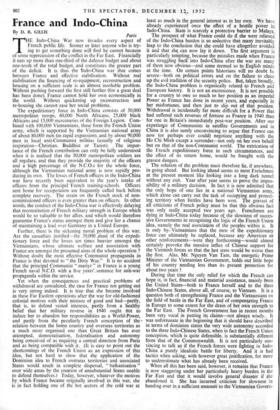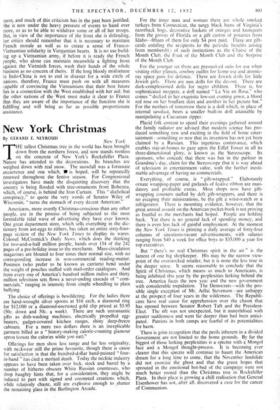France and Indo-China
By D. R.GILLIE
Paris
THE Indo-China War now invades every aspect of French public life. Sooner or later anyone who is try- The expeditionary force in Indo-China consists of 50,000 metropolitan troops, 60,000 North Africans, 25,000 black Africans and 15,000 mercenaries of the Foreign Legion. Corn- - bined with 100,000 Vietnamians, these form the French Union army, which is supported by the Vietnamian national army of about 80,000 men (in rapid expansion), and by about 90,000 men in local anti-Communist militias (usually of religious inspiration—Christian, Buddhist or Taoist). . The impor- tance of the French contribution can only be fully understood when it is realised that the 50,000 metropolitan soldiers are all regulars, and that they provide the majority of the officers and a high percentage of the N.C.O.s for the whole force, although the Viemamian national army is now rapidly pro- ducing its own. The losses of French officers in the Indo-China war have recently been equivalent to the year's intake of officers from the principal -French training-schools. Officers sent home for recuperation are frequently called back before complete recovery. The strain on the French stock of non- commissioned officers is even greater than on officers. In other words, the conduct of the Indo-China war is effectively delaying that reconstitution of French military strength in Europe which would be so valuable to her allies, and which would therefore guarantee France's status amongst them and give her a chance of maintaining a lead over Germany in a United Europe.
Further, there is the sickening moral problem of this war. Are the casualties justified—the 30,000 _dead of the expedi- tionary force and the losses ten times heavier amongst the Vietnamians, whose ultimate welfare and association with France are amongst the presumed aims of the whole operation ? Without doubt the most effective Communist propaganda in France is that devoted to " the Dirty War." It is no accident that the principal Communist " martyr " in France is a young French naval N.C.O. with a five years'_ sentence for anti-war propaganda within the service. Yet when the consequences and practical problems of withdrawal are considered, the case for France not getting out is very strong indeed. It is true that she became involved in these Far Eastern operations after the war for old-fashioned colonial motives with their mixture of good and bad—partly, that is, to defend vested interests, partly from a healthy belief that her military reverse in 1940 ought riot to induce her to abandon her responsibilities as a World-Power, and partly from the peculiarly French conception of the • relation between the home country and overseas territories as a much more organised one than Great Britain has ever attempted, democratisation, federalisation and autonomy being conceived of as requiring a central direction from Paris and as being compatible with it. (It is easy to point out the shortcomings . of the French Union as an expression, of this idea, but not hard to show that the application of the Dominion idea to French overseas territories and associated States would result in complete dispersal, " balkanisation " over wide areas by the creation of unsubstantial States unable to defend themselves.) Today, however, whatever the motives by which France became originally involved in this war, she is in fact holding one of the hot sectors of the cold war at least as much in the general interest as in her own. We have already experienced once the effect of a hostile power in Indo-China. Siam is scarcely a protective barrier to Malaya.
The prospect of what France could do if she were relieved of the Indo-China burden is so seductive that many inevitably leap to the conclusion that she could have altogether avoided it and that shk can now lay it down. The first argument is particularly tempting, because the mistakes made when France was struggling back into Indo-China after the war are many of them now obvious—and some Seemed so to English minds at the time. On certain points historians will no doubt be severe—both on political errors and on the failure to clean up the evil tradition of the security police. But, taken broadly, the Indo-China problem is organically related to French and European history. It is not an excrescence. It is not possible for a country to owe so much to her position as an imperial Power as France has done in recent years, and especially in her misfortunes, and then just to slip out of that position. Withdrawal is incidentally far more difficult for a Power that had suffered such reverses of fortune as France in 1940 than for one in Britain's immediately post-war position. After our experiewe of Communists in satellite Governments and in China it is also surely unconvincing to argue that France can now (or perhaps ever could) negotiate anything with the Ho Chi Minh except a surrender—not only on her own behalf but on that of the non-Communist world. The extrication of the FrenCh expeditionary force in such circumstances, and the effect of its return home, would be fraught with the gravest dangers.
The solution of the problem must therefore lie, if anywhere, in going ahead. But looking 'ahead seems to most Frenchmen at the present moment like looking into a long dark tunnel _ without any exit. Year after year seems to prove the impos- sibility of a military decision. In fact it is now admitted that the only hope of one lies in a national Vietnamian army, which alone can carry out the task of occupying and protect- ing territory when battles have been won. The gravest of all criticisms of French policy must be that this obvious fact was only really accepted two years ago. Frenchmen are dying in Indo-China today because of. the slowness of succes- sive Governments in recognising the logic of the French Union idea, namely the real association of the peoples within it. It is only by- Vietnamians that the men of the expeditionary force can ultimately be replaced, because any American or other reinforcements--were they forthcoming—would almost certainly provoke the massive influx of Chinese support for the Vietminh forces so that the last state would be worse than the first. Alas. Mr. Nguyen Van Tam, the energetic Prime Minister of the Vietnamian Government, holds out little hope of his country needing less than its -present protection for about two years !
During that time the only relief for which the French can hope is, in fact, financial and material assistance, mainly-from the United States—both to France herself and to the three Indo-Chinese States, above all, of course, to Vietnam. It is a question both of strengthening France and the Vietnamians on the field of battle in the Far East, and of compensftting France in Europe to some extent for the drain of her own strength to the Far East. The French Government has in recent months been very vocal in putting its claims—not always wisely. It was unfortunate in the beginning that it should have described in terms of dominion status the very wide autonomy accorded to the three Indo-Chinese States, when in fact the French Union conception, which is quite defensible, is substantially different from that of the Commonwealth. It is not particularly con- vincing to talk as if the French forces were fighting in Indo- China a purely Idealistic battle for liberty. And it is bad tactics when asking, with however great justification, for more to underestimate what has already been received.
When all this has been said, however, it remains that France is now staggering under her particularly heavy burden in the Far East and that it would involve general disaster if she abandoned it. She has incurred criticism for slowness' in handing over in a sufficient measure-to the Vietnamian Govern- went, and much of this criticism has in the past been justified. She is now under the heavy pressure of events to hand over more, so as to be able to withdraw some or all of her troops. But, in view of the importance of the front she is defending, her critics should remember that it is necessary to maintain French morale as well as to create a sense of Franco- Vietnamian solidarity in Vietnamian hearts. It is no use build- ing up a Vietnamian army, if before it is ready the French people, Who alone can maintain meanwhile a fighting front against the Vietminh forces, wash their hands of the whole business as no concern of theirs. If the long bloody misfortune in Indo-China is not to end in disaster for a wide circle of nations, therefore, France must push on with all measures capable of convincing the Vietnamians that their best future lies in a connection with the West established with her aid; but the other nations of the West must make it clear to France that they are aware of the importance of the function she is fulfilling and will bring as far as possible proportionate assistance.



































 Previous page
Previous page